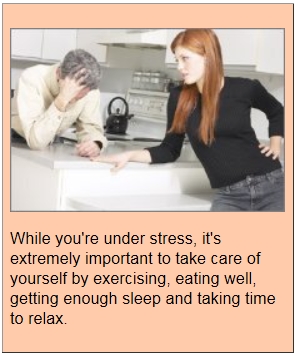Some Startling Stress and Anxiety Statistics and
What You Can Do to Eliminate Your High-Stress
©2015 Health Realizations, Inc. Update
A full 43 percent of U.S. adults suffer adverse health effects from stress, according to an American Psychological Association (APA) study.
 Not only does stress and anxiety interfere with your
immune system, making you vulnerable to illnesses
like the flu, it impairs your body's ability to respond to
its anti-inflammatory signals, putting you at an
increased risk of allergies, autoimmune diseases and
heart disease.
Not only does stress and anxiety interfere with your
immune system, making you vulnerable to illnesses
like the flu, it impairs your body's ability to respond to
its anti-inflammatory signals, putting you at an
increased risk of allergies, autoimmune diseases and
heart disease.
In other words, chronic stress is known to actually intensify inflammation, according to the APA, which makes you more vulnerable to inflammatory and neurodegenerative diseases like multiple sclerosis.
Stress can also trigger or worsen diabetes, if you already have it. When your body is stressed it releases stress hormones that automatically secrete extra sugar into your bloodstream (which is, of course, not a good thing for someone who is already struggling with diabetes).
You may not have known that stress can actually accelerate aging. According to a study presented at the 114th Annual Convention of the APA, people with chronic stress are more likely to suffer from age-related diseases including Alzheimer's disease, major depression, osteoporosis and metabolic syndrome.
Stress can even impact your weight. According to the Study of Women's Health Across the Nation, the greater the stress in a woman's life, the greater her weight. This was true even after other factors, like exercise habits, diet and smoking, were accounted for.
Plus a recent study published in the journal Obesity found that children whose parents were stressed as well as kids who were being bullied at school, were more likely to be stressed or depressed themselves. This, in turn, made it more difficult for kids who were overweight or obese to return to a healthier weight.
The #1 Cause of Stress
According to The American Institute of Stress (AIS), "Job stress is far and away the major source of stress for American adults ... and it has escalated progressively over the past few decades."
Consider the following statistics from the National Institute for Occupational Safety and Health:
- 40% of workers say their job is very or extremely stressful
- 25% view their jobs as the number one stressor in their lives
- 75% of employees believe workers have more on-the-job stress than a generation ago
- 29% of workers say they feel "quite a bit or extremely stressed at work"
- Problems at work are more strongly associated with health problems than any other life stressor, including financial or family problems
Stress in the workplace is clearly becoming a public health issue. Following are even more startling findings from Integra Survey:
- 65% of workers said that workplace stress had caused them difficulties (and 10% said the difficulties had major effects).
- 62% routinely had work-related neck pain at the end of the day, 44% reported stressed-out eyes, 38% had pain in their hands and 34% reported difficulty sleeping because of work-related stress.
- Nearly one in four workers has cried over workplace stress, and 19% have quit a job because of it.
- Over half of workers say the frequently skip lunch because of job demands.
- 29% have yelled at co-workers because of job stress, 42% say that yelling and verbal abuse are common, and 2% have actually struck someone at work.
Of course, there are many other causes of stress, too. Relationships, health problems, finances, personal safety (in an increasingly dangerous world), and even keeping up with household cleaning, maintenance and property taxes can all cause chronic stress and anxiety.
Five Tips to Reduce Stress in Your Life
According to Dr. Esther Sternberg, director of the Integrative Neural Immune Program at NIH's National Institute of Mental Health (NIMH), "The objective should be not to get rid of stress completely because you can't get rid of stress -- stress is life, life is stress. Rather, you need to be able to use your stress response optimally."
 To do this, you must be able to cope with the stress
that will inevitably pop up in your life, and here are
the top five ways to do so.
To do this, you must be able to cope with the stress
that will inevitably pop up in your life, and here are
the top five ways to do so.
- Exercise: Aside from strengthening your heart and lungs, two organs that can become affected from too much stress, it's also great for your mental health. Exercising increases the levels of endorphins in your body, which stimulate your immune system, reduce stress and put you in a better mood.
Stretching should be integrated with your exercise routine, as it will provide you with increased energy levels and an even greater sense of well-being and takes just 15 to 20 minutes a day. - Take Time to Relax and Get Chiropractic Adjustment: This may sound easy, but how many of you reading this and others you know actually schedule time into your day to relax and enjoy life? Your body and mind know how to relax -- you just need to give them "permission" to do so. For any pain and or tight muscles a chiropractic adjustment can relieve emmense amounts of stress with significant health benefits.
- Get Plenty of Sleep: When we sleep, the stress hormone, cortisol, is lowered, but when we are sleep deprived, cortisol levels rise. Further, your energy levels will go down and you'll be less able to cope with any setbacks during your day.
- Proper Nutrition: Fortifying your body with the nutrients it needs is key to reducing stress (and staying healthy while you’re feeling it), as stress can actually rob your body of nutrients. This means eating plenty of fruits, vegetables and other antioxidant foods while avoiding junk foods.
- Build Strong Friendships: Stress can lead to feelings of depression and even isolation; keeping a network of social ties can help to reduce those negative feelings and boost your mood. Says Psychologist Elissa Epel of the University of California, San Francisco School of Medicine, "Building strong friendships and developing new goals and priorities often can help curb stress."
Sources
Obesitv: 15(7):1799-807
American Psychological Association
The American Institute of Stress
National Institute for Occupational Health and Safety
